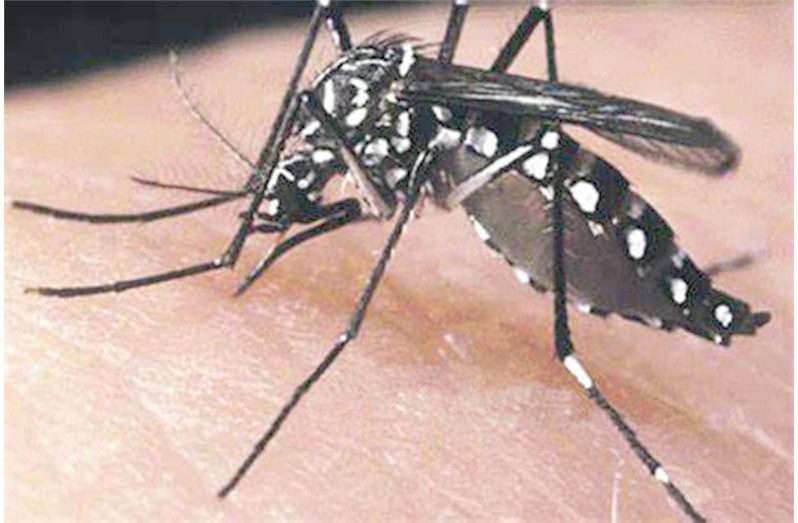FOLLOWING a rise in dengue fever cases in Region Six (East Berbice-Corentyne), the Ministry of Health, through its weekly ‘Health Matters’ programme, has recommended eliminating mosquito breeding sites to aid in containing the disease.
Dengue is spread by the Aedes Aegypti mosquito, and causes sudden high fevers, severe headaches, muscle and joint aches, rash, nausea, vomiting, and pain behind the eyes. In severe cases, it can cause bleeding and can even be lethal.
In February of this year, the Pan American Health Organisation (PAHO) issued an epidemiological alert with regards to the increased risk of dengue outbreaks in the Americas. This was attributed to the growing circulation of the DENV-3 serotype in a number of countries in the region. Dengue has three other serotypes: DENV-1, DENV-2, and DENV4.
PAHO noted that immunity against one serotype provides lifelong protection against that specific serotype alone. This means that subsequent infections from other serotypes can increase the risk of severe forms of dengue.
Director of Vector Control Services at the Ministry of Health, Dr. Reza Niles said that at present, they are seeing many severe cases of dengue.
She said, “So, we’re advocating that persons avoid being bitten, that they take the necessary precautions, make sure that their doors are closed at a certain time, make sure there are no mosquitoes in the home, and no mosquitoes outdoors near the home.”
Dr. Niles noted that with dengue, it is common to have people that are asymptomatic, meaning they have no symptoms, and as such they probably won’t know they are infected.
She recommended that persons go to the doctor the minute they notice signs and symptoms of dengue.
For persons caring for someone who has been diagnosed with dengue, Dr. Niles advised, “Well, first of all, before you start caring for the person, I prefer that you go to your medical practitioner, just to make sure that the patient is okay; that your family member and loved one is stable.”
According to the director, the preventative measures include: Ensuring that there are mesh/shades in the home, on the windows and doors, sleeping under a mosquito net, wearing some long-sleeved clothing, spraying insect repellents recommended by the Environmental Protection Agency (EPA) and the Civil Defence Commission (CDC) on your bodies and clothes, and reducing contact with the mosquito to reduce biting.
To prevent dengue, the doctor recommends that persons take a few minutes to check their yard and the environment to ensure that there are no containers that can potentially become host spaces for the mosquitos to dwell/breed.
Dr. Niles urged, “Go outside in your yard, in the environment, and look at what you can do. Is there any container that could potentially hold water? Discard of it; tyres, flowerpots, anything that could potentially hold water is a potential breeding site for a mosquito.”
She added: “So, what we’re trying to do by doing that, we reduce the mosquito from having a place to lay their eggs and create more mosquitoes, which would probably mean more biting. So that’s what you could do. So, if you have trash accumulated, get rid of that trash. If you have receptacles that need to be thrown away, do that. And that could take 10 minutes every week.”
Further, she pointed out that water tanks are also a breeding site for mosquitos, and therefore recommended cleaning these tanks constantly, along with roof gutters, and our drains.
She also spoke about the positive impact of the fogging exercises being done by the Vector Control Department’s Aedes Department to kill the adult mosquitos. The fogging exercises are currently being done in all regions across Guyana.
Dr. Niles urged members of the public to be receptive to the persons doing the fogging. She said, “They’re doing their job. We ask that you treat them with kindness when you see them. Because I know that some people, they do have one or two complaints, and we’re trying to address them all. But we also ask that you collaborate with the programme so that when you see them fogging, you cheer them on. You open your windows, you prepare, you move people who may have breathing issues or disorders such as asthma, for example. You just move them away from the area so that they don’t breathe in the smoke. Those are some of the few simple things.”
Additionally, larva source management is a method that is being used by the department to eliminate mosquito breeding sites.





.jpg)








